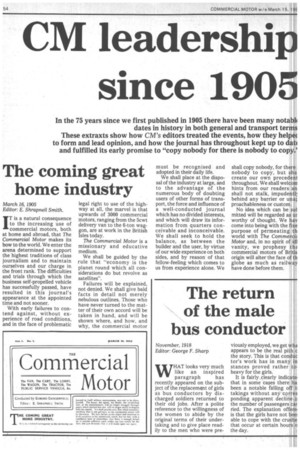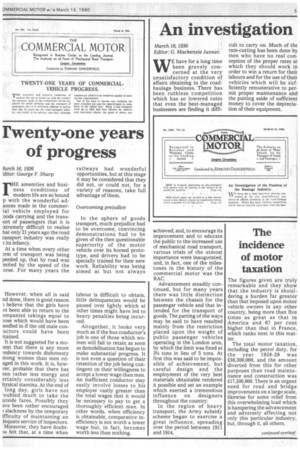The return of the male bus conductor
Page 56

Page 57

If you've noticed an error in this article please click here to report it so we can fix it.
November, 1918 Editor: George F. Sharp WHAT looks very much like an inspired paragraph has recently appeared on the subject of the replacement of girls as bus conductors by discharged soldiers returned to their old jobs. After a polite reference to the willingness of the women to abide by the original terms of their undertaking and to give place readily to the men who were pre viously employed, we get wha appears to be the real pith ,c the story. This is that conduc tor's work has in many in stances proved rather to, heavy for the girls.
It is fairly clearly indicate' that in some cases there ha been a notable falling off ii takings without any corres ponding apparent decline.11 the number of passengers car red. The explanation offerei is that the girls have not bee] able to cope with the crushe that occur at certain hours o the day. However, when all is said nd done, there is good reason ) believe that the girls have ot been able to return to the ompanieg takings equal to lose which would have been andled in if the old male conuctors could have been stained.
It is not suggested for a moIent that there is any more mdency towards dishonesty mong women than men enaged in this work. It is, howver, probable that there has een rather less energy and ertainly considerably less hysical stamina. At the end of long day, girls have not .oubled much to take the utside fares. Possibly they ave been rather encouraged ) slackness by the temporary ifficulty of maintaining an lequate service of inspectors. Moreover, they have doubtss felt that, at a time when labour is difficult to obtain, little delinquencies would be passed over lightly which at other times might have led to heavy penalties being incurred.
Altogether, it looks very much as if the bus conductor's job is one of those which women will fail to retain as soon as demobilisation has begun to make substantial progress. It is not even a question of their retention of the job being contingent on their willingness to accept a lower wage than men. An inefficient conductor may easily involve losses to his employer vastly greater than the total wages that it would be necessary to pay to get a thoroughly efficient man. In other words, when efficiency is obtainable, comparative inefficiency is not worth a lower wage but, in fact, becomes worth less than nothing.
































































































































